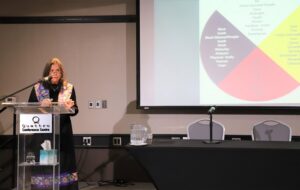Living the Medicine Wheel teachings with Dr. Cynthia Wesley-Esquimaux

By Jesse Johnson
SAULT STE. MARIE, ONT. – Dr. Cynthia Wesley-Esquimaux encouraged Anishinabek health experts to “throw off the Colonial diet” during her keynote presentation at the Anishinabek Nation’s 8th Annual Health Conference in Sault Ste. Marie, Ont., held from Jan. 17-19. Her presentation focused on living the Medicine Wheel teachings, which fit with this year’s theme: Bagidinimaadizidaa mashkawiziiwin ji mashkawiziimigak niigaan - Empowering ourselves to strengthen our future.
Dr. Wesley-Esquimaux is a member of the Chippewas of Georgina Island First Nation. She is a former Vice-Provost (Aboriginal Initiatives) at Lakehead University, Thunder Bay and Orillia, where she is now the Indigenous Chair on Truth and Reconciliation. She is an honourary witness for the Truth and Reconciliation Commission of Canada, and Chair of the Governing Circle for the National Centre for Truth and Reconciliation at the University of Manitoba. Her teaching and academic writing is directed towards understanding historic and inter-generational trauma and unresolved grief within the Indigenous community.
“This Anishinabek Nation Health Conference is about ‘Empowering Ourselves to Strengthen Our Future’ and this is the most significant challenge of our times – we have been throwing off colonial mind shackles for many, many years and more of our children are living very different lives. We are living very different lives, but we are not ‘there’ yet,” she said. “The ‘there’ we are seeking has not been totally defined, but we know it entails reconstitution of our languages, restoration, and instilling of our land-based knowledge in coming generations so they have a choice, [removed through colonization and forced assimilation], and restoring physical, mental, emotional, and spiritual health to our nations.”
Dr. Wesley-Esquimaux went on to talk about the impact institutions have had on our people.
“We’ve learned a lot of negative behaviours from a lot of places, whether it was missionaries, European practises we were subjected to, or Residential Schools. Those institutions are still affecting our people and we need to do something about it,” she explained. “There’s been a lot of colonization and forced assimilation, but I think we’ve come through that very well. You can still look around and see lots of brown faces and that is our celebration. That’s what we’ve been able to do; however, we’re still working on restoring the physical, mental, emotional, and spiritual health of our nations and that’s what is really important.”
She then questioned our commitment to our diet.
“We have the power through consciousness to stop the increasing levels of diabetes, high blood pressure, and other systemic disorders in our nations, so why wouldn’t we?” she asked. “We need to limit the consumption of poverty foods like bannock. Too much is not good. There’s no fibre in it, it is white flour and lard, given to us as part of a starvation diet, so eat it if you have to, but put some raisins and some bran flakes in there… I have a deeper understanding after more than 30 years of research, dialogue, observation, and my own health challenges what we must do as a collective to ensure health and well-being. It has everything to do with adjusting our state of mind, getting in touch with our emotional states, reconnecting our bodies to the land, and remembering who we truly are as spiritual beings as well as ‘human beings’.”
She spoke about the lack of dentists and doctors in Sioux Lookout when she worked there. She said children were losing their teeth because they consumed too much sugar.
“During my doctoral work, I was told the Sioux Lookout Zone Hospital’s biggest caseload was removal of rotten teeth from children, of course this was also because dentists did not regularly attend to remote communities but was also attributed to sugared tea and pop given to very young children, and we are not the only ones. Too many children in Mexico and South America are similarly affected.”
One participant who wished to remain anonymous said, “My mom went to Residential School. Growing up, we didn’t have pop or candies. I should think I was deprived of those sweets, but I don’t.”
Dr. Wesley-Esquimaux continued to speak about diabetes and how our people are developing these conditions earlier in life.
“Diabetes is now the leading cause of blindness, heart, and kidney failure, and limb amputations, to say nothing of the chronic elevated blood sugars and insulin resistance growing within our peoples. We are developing these conditions earlier and earlier, systemic disorders that might happen in our 70s and 80s (for those among us that live that long) are now happening in our 30s and 40s and the rates are rising globally.”
Switching gears, she spoke about our children and the lack of traditional teachings passed down to them.
“In regard to our children, I am calling for a return to the teachings of traditional child-rearing practices – wise practices passed to us from our ancestors, yes, they were pushed aside by circumstances, but they are still there, still us, and absolutely useful. We have heard that it takes a village to raise a child, it is also true that it takes a toxic culture to make us forget how to,” she stated. “I have heard again and again, ‘Every Child Matters’, but I want you to go beyond that statement to a new action: Ask yourself What matters to every child? Do the necessary work to answer this question with the direct help of your youngsters and please, do more of that every day.”
For more information about Anishinabek Nation health, please visit: www.anishinabek.ca.

